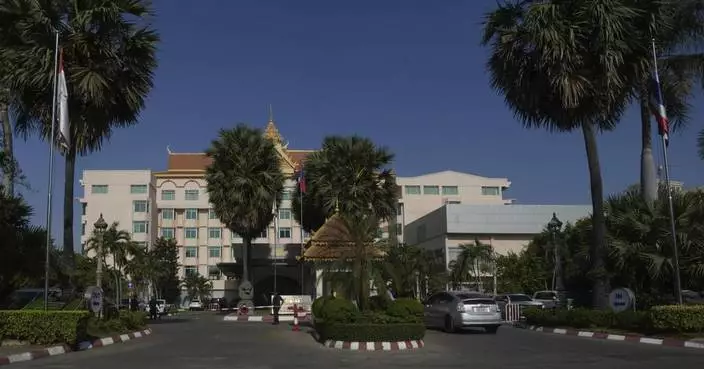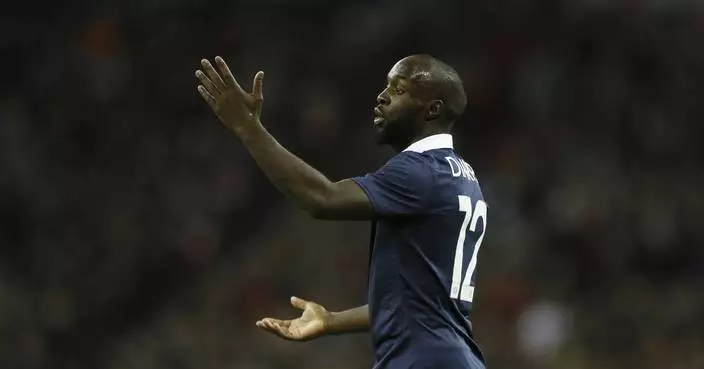Theresa May has joined the ranks of Conservative prime ministers whose time in office has been overwhelmed — and cut short — by the issue of Europe.
Ever since Edward Heath took the U.K. into what was then the European Economic Community in 1973, the Conservative Party has been anguished by how close the country's ties should be with the continent.
On Friday, May announced she, too, would resign as party leader, effective June 7, because of her inability to deliver on a referendum to leave the European Union.
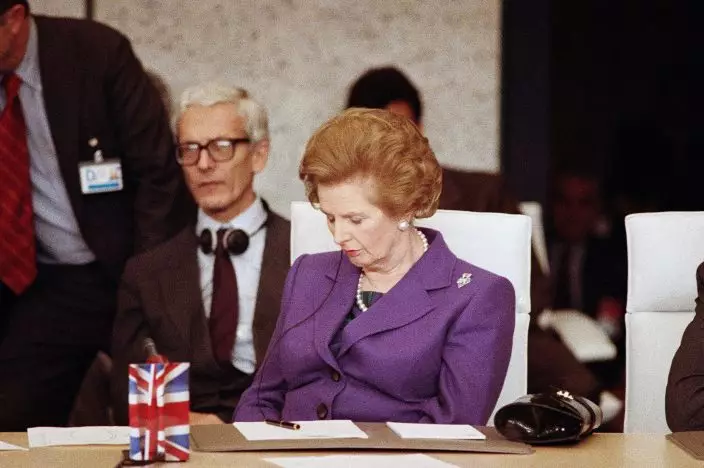
FILE - In this Thursday, Nov. 20, 1990 file photo, British Prime Minister Margaret Thatcher dozes off for a few minutes while attending the Conference on Security and Cooperation in Europe. A few days later, Thatcher resigned after 11 years as prime minister, largely because of her strident views on future European integration. On Friday, May 24, 2019 announced she would resign as party leader, effective June 7, because of her inability to deliver on a referendum to leave the European Union. May has joined the ranks of Conservative prime ministers whose time in office has been overwhelmed — and cut short — by the issue of Europe. (AP PhotoLionel Cironneau, File)
Here's a look at what happened to Heath and his successors.
EDWARD HEATH, prime minister 1970-74
On taking office, Heath made membership of the EEC a key objective. He was fortunate to have in Georges Pompidou a French president more amenable to the prospect of Britain joining the bloc than his predecessor Charles de Gaulle, who twice in the 1960s vetoed British membership.
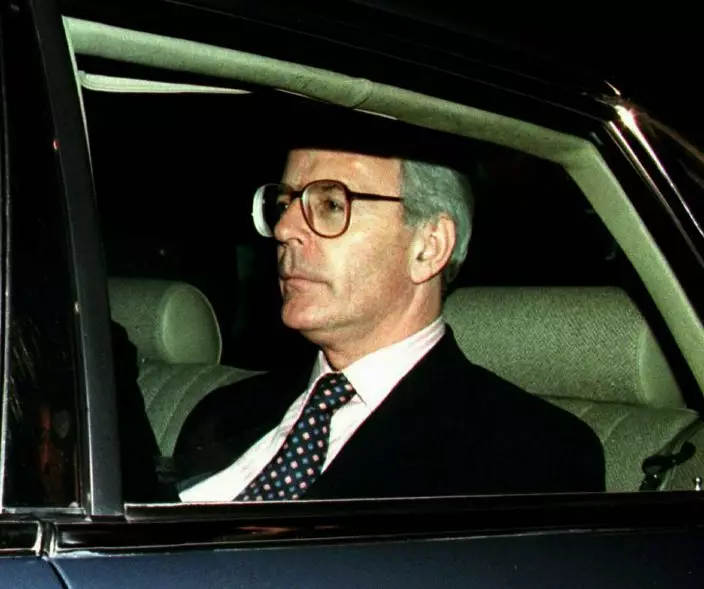
FILE - In this Friday May 2, 1997 file photo, British Prime Minister John Major drives away after retaining his parliamentary seat in the general election that his Conservative Party lost. On Friday, May 24, 2019 announced she would resign as party leader, effective June 7, because of her inability to deliver on a referendum to leave the European Union. May has joined the ranks of Conservative prime ministers whose time in office has been overwhelmed — and cut short — by the issue of Europe. (AP PhotoLynne Sladky, File)
In October 1971, the House of Commons voted 356-244 to join the EEC in 1973, with a sizeable chunk of Heath's own party voting against the measure. Heath and the Conservatives were voted out of office a year later after an economic crisis, and his passionate pro-European stance weighed against him when Margaret Thatcher challenged him for the party's leadership in 1975.
MARGARET THATCHER, prime minister 1979-90
Thatcher was a keen backer of the EEC at first; she even wore a sweater with the flags of the member countries during Britain's first referendum on membership of the bloc in 1975. But her 11 years in Downing Street were marked by growing opposition to Europe.
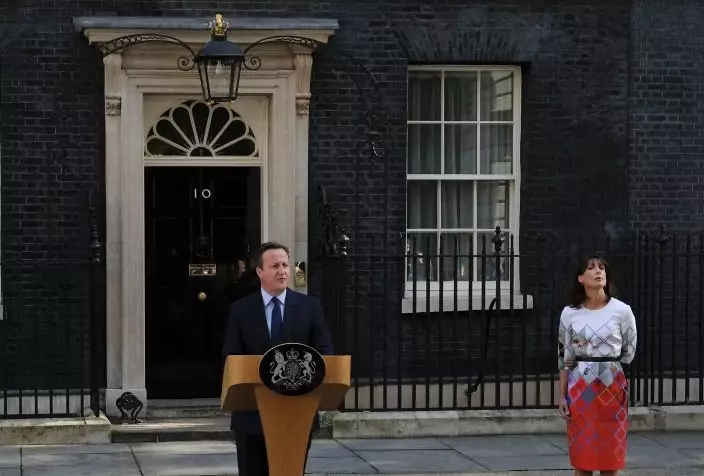
FILE - In this Friday, June 24, 2016 file photo, British Prime Minister David Cameron speaks outside 10 Downing Street, London as his wife Samantha looks on. Cameron announced his plan to step down, a day after Britain voted to leave the European Union in a referendum. On Friday, May 24, 2019 announced she would resign as party leader, effective June 7, because of her inability to deliver on a referendum to leave the European Union. May has joined the ranks of Conservative prime ministers whose time in office has been overwhelmed — and cut short — by the issue of Europe. (AP PhotoAlastair Grant, File)
Though her government backed the creation of the single European market in the mid-1980s, she became increasingly hostile to the move to further integrate European countries.
The appointment of French socialist Jacques Delors to head the executive European Commission added fuel to her fire. Thatcher and a growing part of the Conservative Party were aghast at Delors' ambition for a single currency.
In a 1988 speech, Thatcher rejected the prospect of a "European super-state exercising a new dominance from Brussels." Not everyone in her party was that hostile, and Thatcher's growing antipathy to Europe prompted the 1990 resignation of her deputy — and then her own.
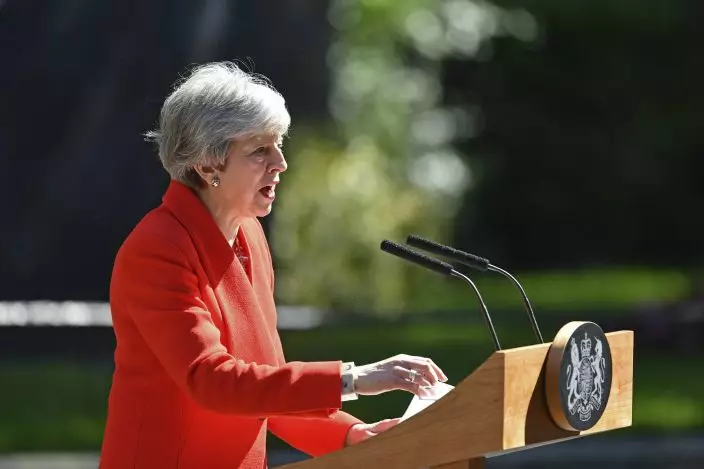
Britain's Prime Minister Theresa May makes a statement outside at 10 Downing Street in London, Friday May 24, 2019. Theresa May says she'll quit as UK Conservative leader on June 7, sparking contest for Britain's next prime minister. (Dominic LipinskiPA via AP)
JOHN MAJOR, prime minister 1990-97
Thatcher's successor, John Major, sought to mend fences with Europe, even while keeping Britain out of the single currency. His government would soon descend into civil war over the Maastricht Treaty, which bolstered integration on an array of issues including foreign policy, and led to the creation of what is now known as the European Union.
Many of the hard-line euroskeptic lawmakers who have bedeviled May's leadership came to the fore during Major's premiership, and it was clear that the party was riven by the issue of Europe, both in parliament and beyond.
Hugely divided, the Conservatives suffered one of their worst defeats in history in 1997 — after 18 years in office — in an election that saw Tony Blair lead a decidedly pro-European Labour Party into power. His ambition was to put Britain in the "heart of Europe" and he even indicated a willingness for the country to join the euro currency, which launched in 1999.
DAVID CAMERON, prime minister 2010-16
During the Blair years, the Conservatives became more and more hostile to the EU, but Cameron promised that his party would no longer continue "banging on about Europe." Nonetheless, Cameron couldn't avoid the issue when becoming prime minister in 2010, leading a coalition with the far-more pro-European Liberal Democrats.
With the U.K. Independence Party making headway with its demand for a referendum on Britain's membership, Cameron felt compelled to call a vote to bind his party together. Cameron mounted a "Remain" campaign, confident Britons would heed his call to stay a part of the European Union.
But in the referendum on June 23, 2016, 52 percent of voters chose to leave, dooming Cameron's hopes. He resigned a day later, and May won the ensuing succession battle, promising to deliver Brexit
THERESA MAY, prime minister 2016-19
May favored remaining in the EU during the referendum campaign, but embraced Brexit after voters had their say. Negotiating Britain's departure from the EU became her top priority.
She formally set the process in motion by triggering Article 50 on March 29, 2017, which gave Britain two years to negotiate a withdrawal deal. Her government eventually reached an agreement with EU leaders, but it never gained backing in Britain's Parliament, which defeated the bill three times.
Her efforts to build cross-party support in Parliament failed when talks with the opposition Labour Party collapsed, and plans for a new approach were soundly rejected by fellow Conservatives, leading to May's announcement Friday that she will step down as party leader on June 7.
Gregory Katz contributed to this story.
Follow AP's full coverage of Brexit at: https://www.apnews.com/Brexit
BEIRUT (AP) — The European Union announced Thursday an aid package for Lebanon of 1 billion euros — about $1.06 billion — much of which will go to boost border control to halt the flow of asylum seekers and migrants from the small, crisis-wracked country across the Mediterranean Sea to Cyprus and Italy.
The deal follows other EU aid packages for countries such as Egypt, Tunisia and Mauritania to fortify their borders. It comes against a backdrop of increasing hostility toward Syrian refugees in Lebanon and a major surge in irregular migration of Syrian refugees from Lebanon to Cyprus.
European Union Commission President Ursula von der Leyen said during a Beirut visit with Cypriot President Nikos Christodoulides that the aid distribution will start this year and last till 2027.
The bulk of the aid — 736 million euros — would go to support Syrian refugees “and other vulnerable groups” in Lebanon, while 200 million euros are meant to bolster Lebanese security services in enforcing border and migration control, according to figures provided by the Cypriot government.
An unspecified amount would go to Lebanese fishermen, to discourage them from selling their boats to smugglers.
Von der Leyen said the EU will also work on a “more structured approach to voluntary return" of Syrian refugees "in close cooperation with” the U.N. refugee agency. The bloc will continue to maintain “legal pathways” for resettlement of refugees in Europe, she said.
Lebanon's caretaker Prime Minister Najib Mikati praised the package, saying that “Lebanon’s security is security for European countries and vice versa,” and that an escalation of the crisis ”will not be limited to Lebanon but will extend to Europe."
Lebanon, which has been in the throes of a severe financial crisis since 2019, hosts nearly 780,000 registered Syrian refugees and hundreds of thousands more who are unregistered, the world's highest refugee population per capita.
Lebanese political officials have for years urged the international community to resettle the refugees in other countries or assist their return to Syria — voluntarily or not. Lebanese security forces have stepped up deportations of Syrians over the past year.
Tensions further flared after an official with the Christian nationalist Lebanese Forces party, Pascal Suleiman, was killed last month in what military officials said was a botched carjacking by a Syrian gang. The incident prompted outbreaks of anti-Syrian violence by vigilante groups.
Meanwhile, Cypriot authorities complain the island nation has been overwhelmed by irregular migration of Syrian asylum seekers, many of them coming on boats from Lebanon.
The UNHCR in Lebanon said it had verified 59 “actual or attempted” departures by boats carrying a total of 3,191 passengers from Lebanon between January and mid-April, compared to three documented boat movements carrying 54 passengers in the same period last year. Usually, few boats attempt the much more dangerous crossing in the winter. In all of 2023, UNHCR recorded 65 boat departures carrying 3,927 passengers.
Cyprus has taken a new approach to halting the flow of migrants. Last month, it suspended processing of Syrian asylum applications, and human rights groups accused the Cypriot coast guard of forcibly turning back five boats carrying about 500 asylum seekers coming from Lebanon. Cypriot officials have denied this.
Bassel al-Shayoukh, a Syrian refugee from Idlib living in Lebanon since 2014, said his brother and several cousins and nephews were on one of the boats turned back. Now he wants to make the journey himself.
“In the beginning I thought that in a year or two the war would be over in Syria,” he said, but it dragged on, while in Lebanon “every year ... the situation began to get worse.”
Shayoukh said he fears being beaten by vigilantes or deported to Syria after Lebanese authorities declined to renew his residency permit.
His 17-year-old nephew, who declined to give his name fearing for his safety, said the Cypriot coast guard started making waves to push the boat he was on away. “I was terrified... I don’t know how to swim,” he said. “I thought we were going to die.”
The people on the boats “stayed three days without food or water” before turning back to Lebanon, the teen added.
Back in Lebanon, they were detained by the army; those registered with UNHCR were released and the others deported.
Mohammed Sablouh, a Lebanese human rights lawyer who works on refugee and migrant cases, says Lebanese authorities are deliberately “turning a blind eye" to the surge in migration to "pressure the international community.”
The Lebanese army did not respond to a request for comment on their measures to combat smuggling.
Thursday's aid announcement comes ahead of the annual fundraising conference for the Syrian crisis in Brussels later this month. After 13 years of civil war, donor fatigue has set in while the world’s attention is occupied by the humanitarian fallout of more recent conflicts in Ukraine and Gaza.
The Cypriot president said Thursday was a “historic day” and called for European officials to go farther and declare some areas of Syria safe for return.
“The current situation is not sustainable for Lebanon. It is not sustainable for Cyprus, it is not sustainable for the European Union,” Christodoulides said.
But not all Lebanese officials are convinced the European aid would solve the problem.
Lebanese Forces party head Samir Geagea told The Associated Press earlier this week that European authorities are mainly concerned “that the refugees don’t go to Europe."
"For us the problem is that we cannot have our country drowning in illegal Syrian refugees,” Geagea said, urging for Syrians to be sent back to either government or opposition-held areas of the neighboring country.
But Shayoukh says he has nowhere to go.
The Damascus government wants him for opposing Syrian President Bashar Assad, he said, while the Islamist group that now controls his hometown behaves "the same way as the regime’s intelligence services” in crushing dissidents.
Associated Press writer Menelaos Hadjicostis in Nicosia, Cyprus, contributed to this report.
Follow AP’s global migration coverage at: https://apnews.com/hub/migration

Lebanese caretaker Prime Minister Najib Mikati, center, speaks during his meeting with Cyprus' President Nikos Christodoulides, left, and President of the European Commission Ursula von der Leyen at the government palace in Beirut, Lebanon, Thursday, May 2, 2024. (AP Photo/Hassan Ammar)
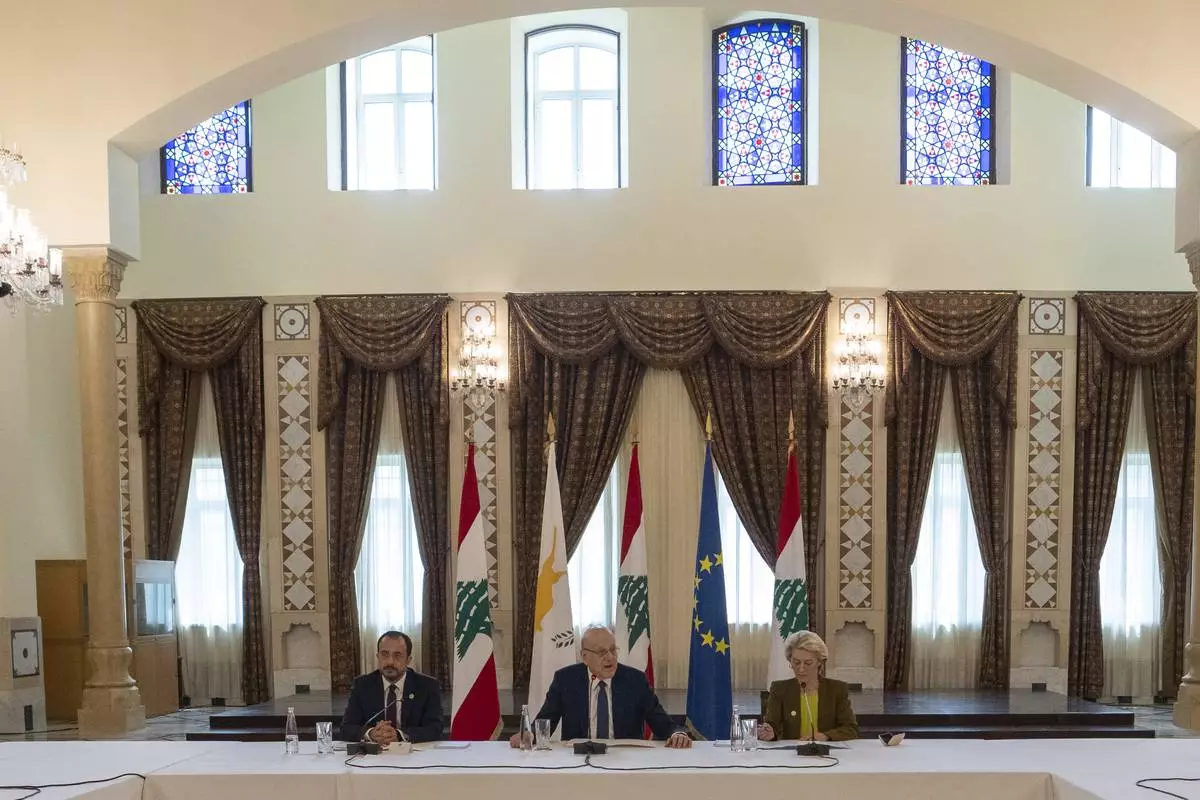
Lebanese caretaker Prime Minister Najib Mikati, center, speaks during his meeting with Cyprus' President Nikos Christodoulides, left, and President of the European Commission Ursula von der Leyen at the government palace in Beirut, Lebanon, Thursday, May 2, 2024. (AP Photo/Hassan Ammar)

Lebanese caretaker Prime Minister Najib Mikati, center, welcomes Cyprus' president Nikos Christodoulides, left, and President of the European Commission Ursula von der Leyen before their meeting at the government palace in Beirut, Lebanon, Thursday, May 2, 2024. (AP Photo/Hassan Ammar)
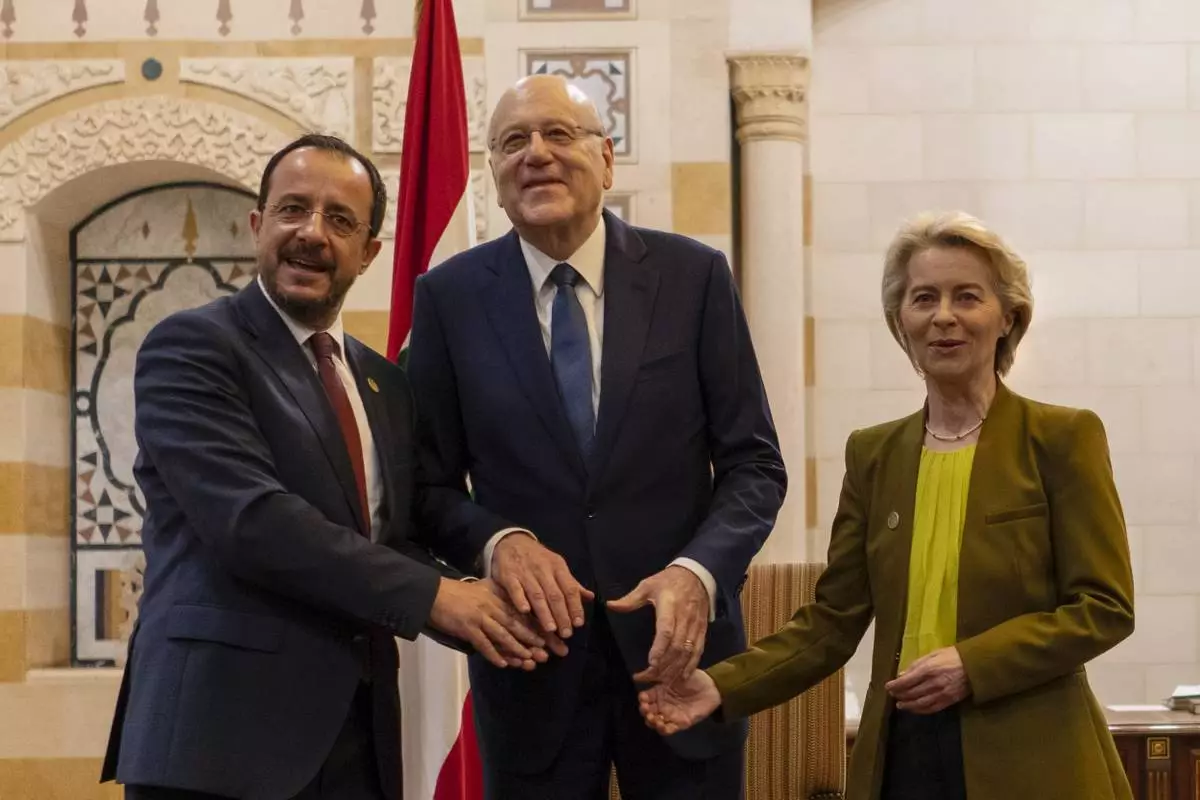
Lebanese caretaker Prime Minister Najib Mikati, center, Cyprus' President Nikos Christodoulides, left, and President of the European Commission Ursula von der Leyen pose for photograph at the government palace in Beirut, Lebanon, Thursday, May 2, 2024. (AP Photo/Hassan Ammar)
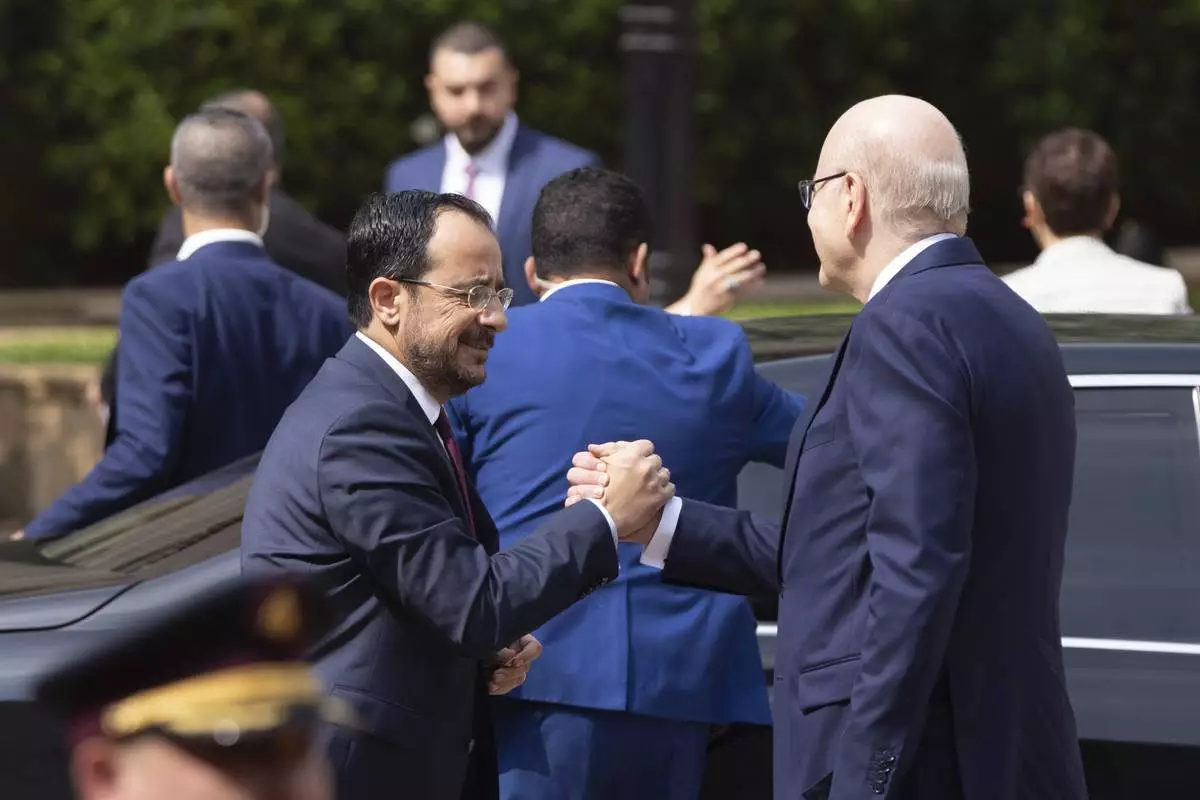
Lebanese caretaker Prime Minister Najib Mikati, right, welcomes Cyprus' president Nikos Christodoulides before their meeting at the government palace in Beirut, Lebanon, Thursday, May 2, 2024. (AP Photo/Hassan Ammar)

Cyprus' President Nikos Christodoulides, left, and President of the European Commission Ursula von der Leyen, center, review an honor guard upon their arrival to meet with the Lebanese Speaker Nabih Berri, in Beirut, Thursday, May 2, 2024. (AP Photo/Hussein Malla)

Lebanese caretaker Prime Minister Najib Mikati, center, speaks during his meeting with Cyprus' President Nikos Christodoulides, left, and President of the European Commission Ursula von der Leyen at the government palace in Beirut, Lebanon, Thursday, May 2, 2024. (AP Photo/Hassan Ammar)
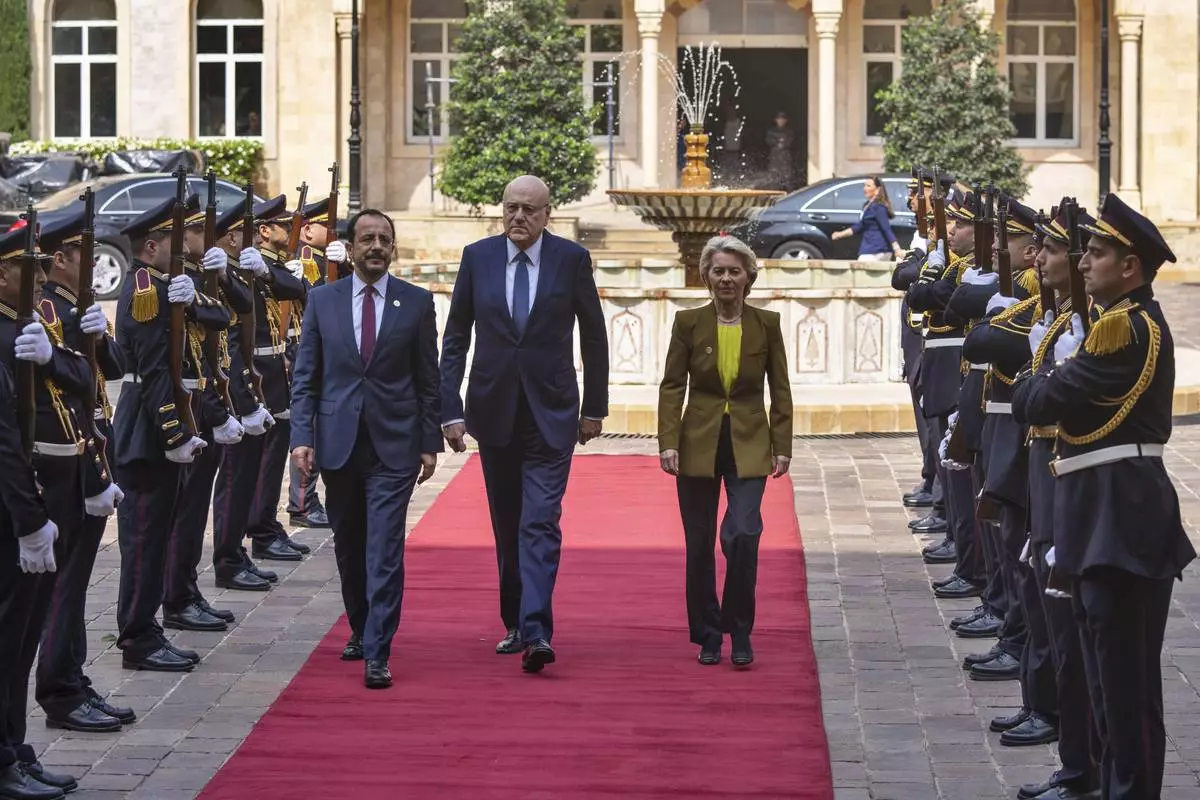
Lebanese caretaker Prime Minister Najib Mikati, center, welcomes Cyprus' President Nikos Christodoulides, left, and President of the European Commission Ursula von der Leyen at the government palace in Beirut, Lebanon, Thursday, May 2, 2024. (AP Photo/Hassan Ammar)
















